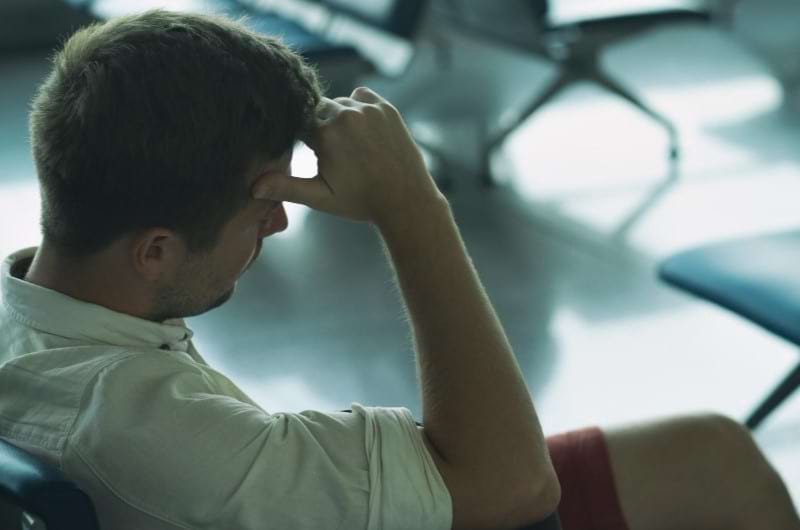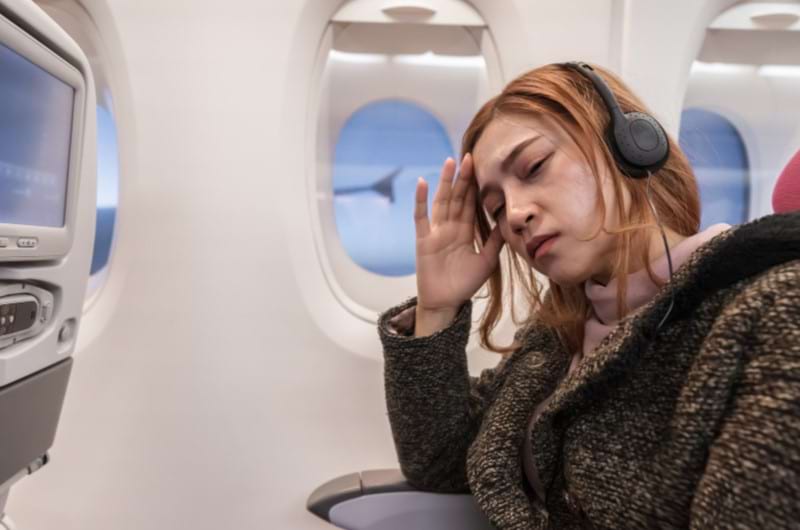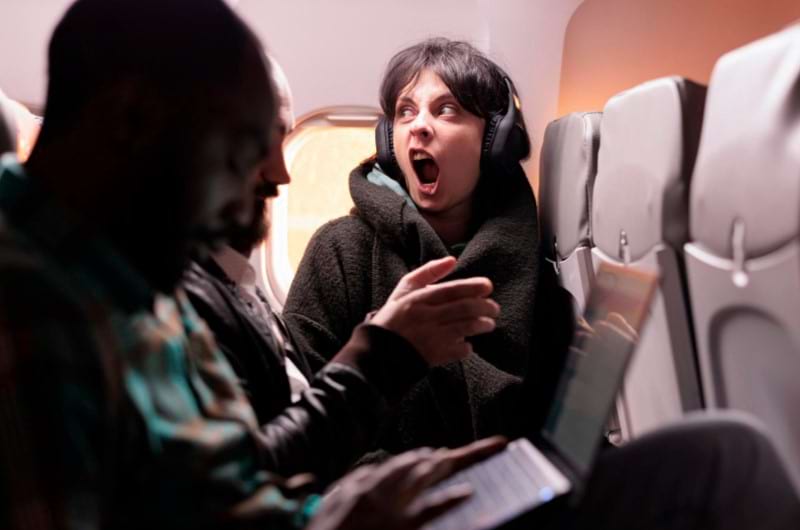Getting cold feet on your first flight is quite normal, but it shouldn’t extend beyond your third and fourth flights. It is crucial to tackle the root causes, like your fear of heights, past traumatic experiences, or anxieties about accidents. Stay positive and use coping strategies to ease your mind. If the anxiety persists, don’t hesitate to seek professional therapy. It can be highly effective in helping you overcome your fears and fly confidently.
Booking your flight ticket is the first step towards reaching your destination. While some people find this to be the easiest thing to do, those with anxiety know that even the thought of being on the flight might be too much for them to handle.
When you reach the departure lounge, you feel a knot in your stomach. It’s like a prickly feeling right inside your heart as the announcement keeps ringing in your head.
All of a sudden, you’ve grown cold feet. You’ve gotten scared of the same flight you booked with your hands. Your head spins, and as worst-case scenarios begin to play in your head, you become overwhelmed with fear.
Probably, this fear could be so severe that you’d contemplate heading back home. If you’ve ever caught yourself in this scenario, you’re not alone.
Whether yours isn’t always at the lounge during takeoff, turbulence, or landing, you still need to know how to overcome that feeling.
If you didn’t know before reading this article, that feeling is called “flight anxiety.”
What is flight anxiety?
Flight anxiety is the sudden fear and uneasiness people experience when they have to fly on an airplane.
It’s that anxious feeling that overwhelms you when you’re thousands of feet off the ground level. See it as that fright that makes you dread the idea of traveling by air.
In most cases, flight anxiety doesn’t refer to that fear on your first flight—nearly everybody gets nervous on their first flight.

It refers to the one in your twentieth and or even fiftieth flight. It just keeps coming whenever you find yourself in an airport or inside an airplane. Flight anxiety can also be called aviophobia or aerophobia.
⚠️ In the United States, statistics from research have shown that over 25 million Americans live with aviophobia, and anxiety is so common that the National Institute of Mental Health describes it as the second most common fear in America.
The fact that 10% of the American population suffers from this anxiety is a cue to how common the anxiety is.
Is flight anxiety intense?
Flight anxiety can be mild or intense. It comes in diverse dimensions, and its severity solely depends on the individual.
It can either be a slight fear or phobia-like reactions like panic attacks.
What are the symptoms of flight anxiety?
Flight Anxiety has symptoms, and they can manifest in diverse ways.
These symptoms can be both physical and mental and can usually come in the form of mild uneasiness or panic attacks.
1. Mental Health
Mental health symptoms of flight anxiety include:
- Panic attacks
- Extreme worry
- Negative pessimism
- Dread
- Chills
2. Physical symptoms
On the other hand, the common physical symptoms are:
- Gastrointestinal disturbance
- Trembling or shaking
- Sweating
- Nausea
- Increased heart rate
- Dizziness
- Tight chest
- Muscle contractions
If you experience these symptoms every time you visit an airport or find yourself inside an airplane, you’re probably suffering from flight anxiety.
Is there a need to panic?
No. Flight anxiety is a common fear that you can learn to overcome, and you can learn how to overcome it and fly without fear.
Is the fear of flying an anxiety disorder?
Medical institutions do not classify the fear of flying as an anxiety disorder. It is instead classified as a phobia.
However, in extreme cases where fear of flying interferes with everyday life, causing distress and complete abstinence from air travel, psychologists classify it as a specific phobia.
Specific phobia, known as SP, is a subcategory of anxiety disorders that can be treated using standard therapies like Cognitive-behavioral therapy (CBT).
What causes flight anxiety?
Flight anxiety is not an anxiety disorder. It’s simply another form of phobia.
Phobias are triggered by many things, usually based on individual experiences. This accounts for why different people get triggered by various factors.
Why you get sweaty and terrified about flying in an airplane might be different from why your spouse, child, or even next-door neighbor feels the same way.

However, everyday things are known to be the primary triggers of flight anxiety.
- Fear of height (acrophobia)
- Past airplane-related trauma
- Fear of confined spaces (claustrophobia)
- Exposure to disturbing news—terrorism, weather forecast
- Turbulence (take-off and landing)
- Anxiety and stress
- Health concerns
- Fear of accident (crashing)
You need to understand that this list is not exhaustive and that people get triggered depending on their exposure to these causative factors.
Are there coping techniques for flight anxiety?
Flight anxiety can be effectively managed with the help of some coping techniques.
However, a person has to first understand some basic things about air transportation.
Studies have shown that misconceptions about air travel trigger the symptoms in most flight anxiety victims they are consistently exposed to.
That brings us to the question:
How safe is air travel?
Over the years, air transportation has been proven to be the fastest, easiest, and safest means of transport.
📌 According to the Internal Air Transport Association (IATA), air is the safest form of long-distance transport. In 2018, statistics from its database showed that the accident rate (measured in accidents per 1 million flights) was 1.35, equivalent to one accident for every 740,000 flights.
In straightforward terms, this landed in a fatality risk of 0.17 (in 2018), and that simply means that, on average, a person would have to travel by air every day for 16,581 years to experience a 100% fatal accident.
Air travel is not 100% safe, but its safety margin is way higher than road and water transport.
In essence, the first step to overcoming flight anxiety is accepting that traveling by air is safe.
Proper pre-flight preparation
Preparing correctly for your air trip can reduce flight anxiety by a wide margin. Let’s see how you can do that.
- Try not to forget essential documents at home.
- Ensure to go early so you buy yourself enough time to relax until it’s time for your flight.
- Do you prefer sitting close to the window, near the front, or over the wing? Sort that seat early.
- It could be a book, a headset, or a pad for watching movies—just anything to keep your mind off the thoughts of your trip.
Mental techniques
To completely overcome flight anxiety, you need to go behind the physical anxiety. Appease your mind, too. Below are a few ways you can do that.
- Get yourself into a positive mindset. First, understand that an air trip is safe and keep your mind around that positive sphere.
- The mind feeds on thoughts. Consistently tell yourself that you can beat flight anxiety and stick to it.
- Try to relax by using some of the relaxing techniques you must have practiced at home. You can take a walk around the airport. Get yourself some hot tea, read something inspiring, listen to a podcast, or talk to family members until take off. Never forget to take deep breaths when it feels so overwhelming.
- If you can, always travel with someone without flight anxiety. He or she can help you overcome flight anxiety.
Does flight anxiety need medications?
Some people with flight anxiety suffer extreme distress and discomfort that make them unable to respond to non-medicinal coping techniques. In some cases, it gets to the point where their overall well-being is completely affected.
The common medications for flight anxiety are antidepressants, prescription sedatives, anti-anxiety therapies (the most common of them for fighting flight anxiety is cognitive-behavioral therapy (CBT) ) or beta-blockers.
However, having only certified professionals handle this sort of medication is important.
FAQs
Is the fear of flying a mental illness?
Fear of flying is not a mental illness. It is regarded as a phobia, which is different from a mental illness. However, it is necessary to note that fear of flying can be associated with mental health conditions like generalized anxiety disorder.
Can flight anxiety be overcome completely, or is it something that individuals learn to manage over time?
Flight anxiety can be managed effectively. Although it can’t be completely treated, many people have learned to cope with it over time through various strategies and support systems.
Does Anxiety trigger fear of flying?
Anxiety is one of the biggest triggers of fear of flying. Anxiety plays a major role in the development and seriousness of this specific phobia.
So, a person with a medical record of anxiety disorder gets fear of flying faster than a person with an anxiety disorder.
Are there specific causes of flight anxiety, and can it be triggered by past experiences?
Flight anxiety can have various causes, including fear of heights, fear of lack of control, or previous traumatic experiences that can trigger anxiety. Yes. It can be triggered by past experience.
How common is it for people with flight anxiety to eventually overcome their fear and enjoy flying?
Many people with flight anxiety have overcome their fear with time.
Effective coping strategies help them get used to the feeling of air travel and allow them to enjoy flying without anxiety. You can overcome it, too.
References
- https://www.choosingtherapy.com/aerophobia/
- https://my.clevelandclinic.org/health/diseases/22431-aerophobia-fear-of-flying
- https://www.statista.com/topics/1707/air-transportation/#topicOverview
- https://www.nbcnews.com/better/health/your-4-step-guide-overcoming-your-fear-flying-ncna786746
- https://adaa.org/living-with-anxiety/ask-and-learn/ask-expert/how-can-i-overcome-my-fear-of-flying
- https://www.wellandgood.com/fear-flying-tips-post-lockdown/
- https://www.anxietyuk.org.uk/anxiety-type/fear-of-flying/
- https://www.verywellmind.com/aerophobia-fear-of-flying-2671844
- https://en.m.wikipedia.org/wiki/Fear_of_flying


